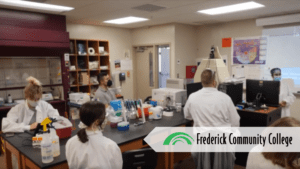
The West Philadelphia Skills Initiative: Building Customized Talent Solutions
By Mark Terry
April 11, 2023
Going on 13 years, the West Philadelphia Skills Initiative (WPSI) has acted as a workforce intermediary with local companies. The Skills Initiative operates a year-round, cohort-based, jobs-driven training model designed to find and train talent. Over the years, the Skills Initiative’s programs have connected more than 91% of graduates to employment with an average hourly starting wage post-program that has risen to $17.96.
Josh Park, Senior Manager of Strategy and Partnerships, and Chris Richman, Director, Marketing and Communications, of WPSI, took time out to speak with BioBuzz about the organization and its life science programs, and where it’s heading.

Park describes the Skills Initiative as building “customized talent solutions that seek to bridge the divide between unemployed Philadelphians looking for opportunity and employers who are looking for talent. We’re really closing the opportunity gap in Philadelphia.”
The reason the program has been so successful, he says, is “because we’re able to match employer and employee needs through partnerships on both sides. So first the Skills Initiative puts employers in the driver’s seat, really to understand their workplace culture, their hiring practices, and their turnover issues. Then we develop customized solutions to meet their needs.”
One of the programs in the life sciences was developed with Philadelphia’s Wistar Institute, the Biomedical Technician Training (BTT) Program. It recently graduated its inaugural spring graduating class of 13. The program connects adults with a high school diploma or GED to high-skill careers in the region’s laboratory environment. The program included 12 weeks at the Wistar Institute followed by 10 weeks as interns at Iovance Biotherapeutics, developing competencies to become aseptic manufacturing technicians.

Park said, “We connected these opportunities to Philadelphians with at least a high school diploma or GED. And most of the folks that joined the programs, that’s what they had, and some work experience that connected them to the kind of work they’d have to do.”
In the 22-week program, there was class- and laboratory-based training provided by the Wistar Institute. After 12 weeks, everybody transitioned into a 10-week paid internship at Iovance. “And also during that time,” Park said, “participants get the skills they need to be considered for employment coaching in partnership with employees and mentors at Iovance. The folks were considered for jobs as associate aseptic manufacturing technicians, maintaining sterile lab environments, assembling sterile products, stocking supplies, documenting processes of the manufacturers, and really supporting the creation of cell therapies.”
To date, 10 of the 13 graduates have picked up jobs, starting at around $23.50 per hour. “Part of the work the Skills Initiative does is to continue to work with the other three graduates, because it’s our goal to see them connect to the next step in their career path,” Park said.
Richman notes that for most of its existence, the Skills Initiative’s programs “were limited just to people who lived within West Philadelphia. We had zip codes that we pulled from. But as we’ve expanded and had partnerships with more city agencies, it now depends on the program. We’re moving much more toward all of Philadelphia. At this time, you have to live in Philadelphia.”
In most cases, applicants must be currently unemployed, although there is a move to include applicants who are under-employed. In the case of laboratory-based programs, applications are required to take a reading and math assessment because it’s a college-level course.
Park adds, “That’s how we sometimes get the career-changers, the under-employed part. When we run our recruitments, we’re very clear about what the schedule is. For example, three nights a week of classes for 10 weeks, then it’s full-time during the day for lab training and moving into an internship that’s also full-time. You have to be able to maintain that schedule.”
The Skills Initiative also has other programs outside biotech and life sciences, such as bus drivers with Philadelphia’s bus system, SEPTA, custodial positions at Penn Medicine, and more.
In 2022, the Skills initiative served over 200 participants, with more than 300 expected to go through the programs this year. Park said, “We have about 50% more cohorts running this year to connect folks to different job opportunities and healthcare and life sciences with Children’s Hospital of Philadelphia (CHOP) and Penn Medicine, Jefferson and Iovance. We’re working in the manufacturing industry a lot at the Navy Yard with companies like Philly Shipyard Incorporated and the Naval Surface Warfare Center, Philadelphia Division.”
The Skills Initiative is also working to push into new roles this year. “It’s our first year partnering with a technical training company to bring people medical assistant certifications for job opportunities at Penn Medicine,” Park said. “We’re also working with the Community College of Philadelphia to bring people through a training program to become certified nurse assistants and connect to jobs, again, at Penn Medicine.”
Overall, the West Philadelphia Skills Initiative is becoming stronger and more diverse.
Park said, “Our programming has helped employers hire and retain entry-level talent, build local hiring pipelines, create meaningful connections with Philly communities, and increase the diversity of new hires. And in the last few years, we’ve developed an incumbent worker training program that helps folks who were hired at those employer partners move up after they’ve been there for a few years. It really brings a wide variety of professional, academic and lived experience to the program through the participants that we recruit.”
- About the Author
- Latest Posts
Mark Terry is a freelance writer, editor, novelist and ghostwriter. He holds a degree in microbiology & public health and spent 18 years in infectious disease research and clinical and research genetics prior to his transition to a writing career. His areas of expertise include biotechnology, pharma, clinical diagnostics, and medical practice management. He has written literally thousands of articles, as well as market research reports, white papers, more than 20 books, and many other written materials. He currently lives in Michigan with his family.








